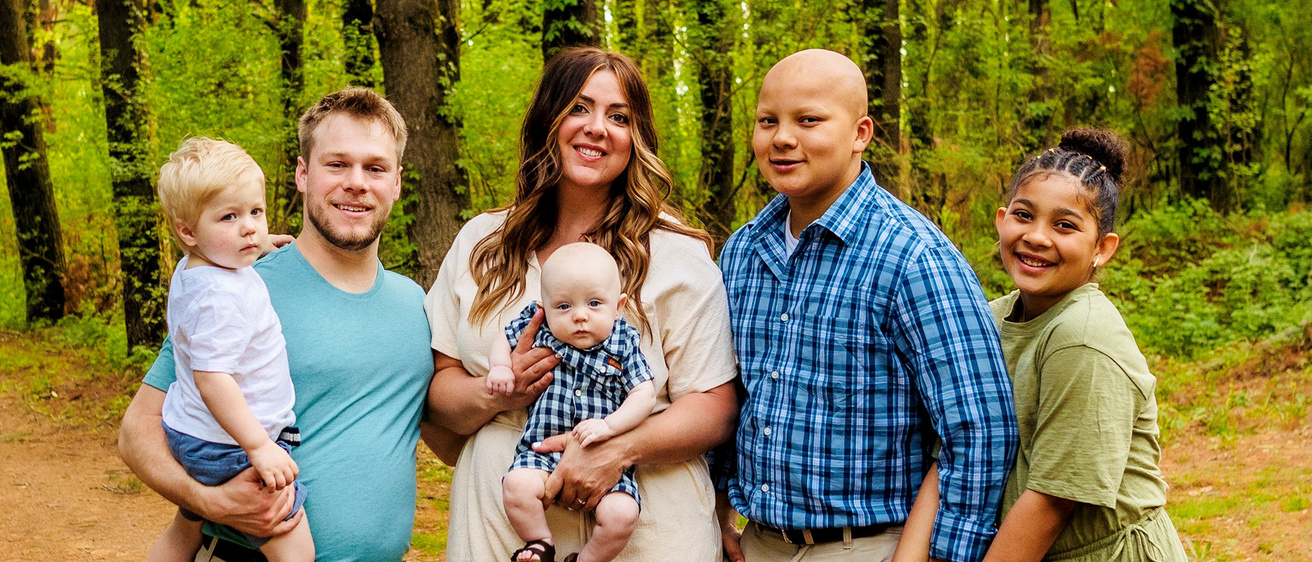University of Iowa Health Care is able to treat a Dyersville family’s wide range of specialty care issues — from mom to baby, from rare to common — all in one place.
Story: Molly Rossiter
Photography: courtesy of the Hall family
Published: Jan. 9, 2023
A rare childhood cancer. A complicated pregnancy. A premature birth. Hair loss from alopecia.
For Ashley and Nate Hall’s family, the past couple of years have been challenging. One after another, four different family members were diagnosed with a new health issue within a span of about a year.
Thankfully, the Halls were all able to be treated at University of Iowa Health Care Stead Family Children’s Hospital and UI Health Care Medical Center, teaching them firsthand how important being in the right place can be.
“You never want to be sick and need to go to Iowa City for care, but it’s the best place you can be,” Ashley says. “We walked through so many doors with so many doctors and our outcomes have always been the best they could be. People trust the doctors there because they know they are the best.”
Starting with the diagnosis of a rare childhood cancer
The Halls’ journey began in February 2020 when their then-10-month-old son James had signs of an ear infection. There was a smell coming from his ear, and the ear canal was swollen. A local doctor diagnosed him with an ear infection and sent him home with antibiotics.
For the next two months, James would cry in the middle of the night, and continued on antibiotic shots.
In May 2020, Nate noticed a swelling on James’ head. There was no bruise so local doctors scheduled a computerized tomography (CT) scan to determine whether the swelling was due to a cyst. Following the scan, the Halls were called back to talk with the doctor — the swelling was due to a 4-millimeter mass and it wasn’t a cyst.
The family was referred to UI Stead Family Children’s Hospital, where doctors diagnosed him with Langerhans Cell Histiocytosis (LCH), a cancer or cancer-like disease that occurs when the body makes too many Langerhans cells in the skin, lungs, and bone.
“It’s very rare,” Ashley says. “One in 200,000 kids are affected by it. The doctors told us that equates to about one diagnosis every five years in Iowa,” where an estimated 40,000 children are born each year.
“University of Iowa just has the right people to take care of it all. I can’t put into words just how comforting it is at terrible times knowing you can put complete trust in your doctors.”
A complicated pregnancy, followed by a premature birth
Around the same time James was diagnosed, Nate and Ashley learned they were expecting their fourth child.
At a 20-week ultrasound at her local hospital in Dubuque, Ashley was told she had placenta accreta, a serious condition that occurs when the placenta grows deeply into the uterine wall. Her local doctors were concerned and forwarded her scans to doctors at UI Health Care Medical Center, who determined Ashley should prepare to deliver at 30 weeks.
“We needed to get the placenta out before it connected to any of my major organs,” she says. “It was already pretty close to my bladder at 20 weeks.”
Ashley had transferred her care to UI Health Care Medical Center, and she received ultrasounds every week to monitor her condition. She was admitted to keep her close to the medical care she would need.
“My uterus was like Swiss cheese — even if I had been a mile away when I went into labor I had a risk of dying,” she says. “I lost five liters of blood in surgery, and that was just in a room with tons of people who knew what they were doing. I had to be fully prepared for that, and luckily I was.”
Her son, Lavon — “Vonnie” — was born Oct. 27, 2021, at 27 weeks, 6 days gestation, and stayed in the neonatal intensive care unit (NICU) at the children’s hospital for a little over two months, when he was stable enough to be transferred to a hospital closer to home. Once discharged, he went home and was on oxygen for a week.
Hair loss from alopecia universalis
While Ashley’s pregnancy was being monitored, her oldest son, Evan Tyler, 11, was getting his hair cut for pictures when his dad found a bald spot.
A local doctor thought it was ringworm and gave him an antifungal cream. After six weeks the condition only worsened and he continued to lose hair.
“He had thick, curly, beautiful hair,” Ashley says. “Then all of a sudden the day after Christmas he took off his stocking cap and it was just full of hair.”
Evan decided to shave his head, and Ashley made an appointment with dermatology at UI Stead Family Children’s Hospital. He was diagnosed with alopecia universalis, a condition in which a person loses all of the hair on their scalp and body.
“It was hard at first, but he’s handling it so awesome,” she says of her son. “He says, ‘I’m just going to be me and I like who I am now.’”
Doctors you can trust
Twelve months. Nearly a dozen specialty divisions. Countless inpatient visits. All in one location.
Everyone in the family is doing well now. James finished his chemotherapy treatments after 12 months, and Vonnie was released from the hospital in Dubuque in January 2022.
“University of Iowa just has the right people to take care of it all,” Ashley says. “I can’t put into words just how comforting it is at terrible times knowing you can put complete trust in your doctors.”
